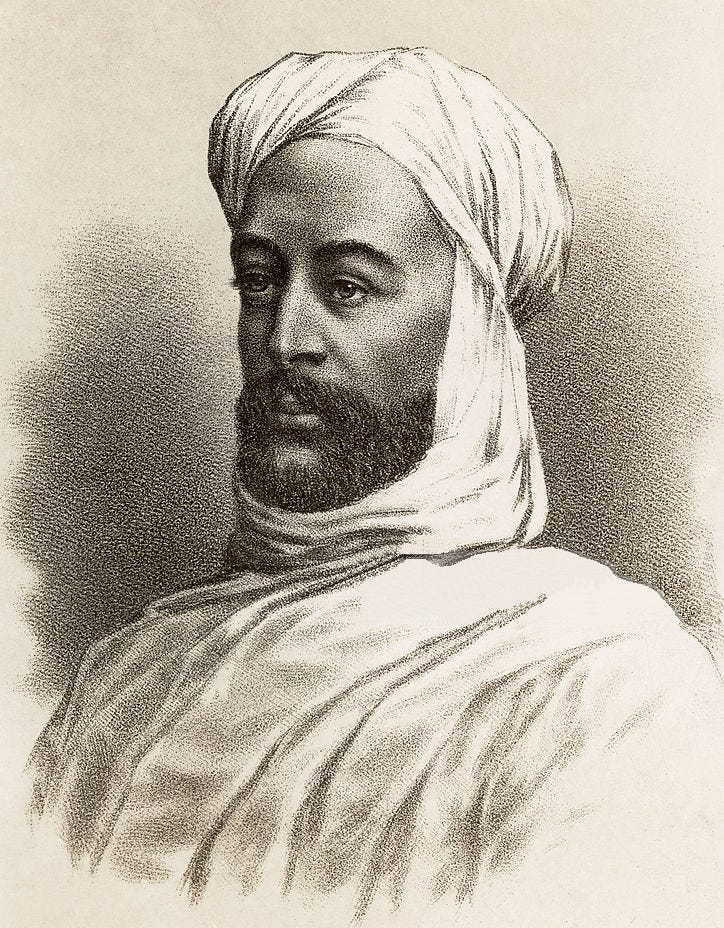Today in North African history: Muhammad Ahmad declares himself the Mahdi (1881)
This marks the start of the 1881-1899 Mahdist War, a Sudanese rebellion against Egyptian control that ended with Sudan effectively a British colony.
If you’re interested in history and foreign affairs, Foreign Exchanges is the newsletter for you! Sign up for free today for regular updates on international news and US foreign policy, delivered straight to your email inbox, or subscribe and unlock the full FX experience:
Long before Abu Bakr al-Baghdadi declared himself Caliph in 2014, which I guess didn’t work out the way he’d intended it, a Sudanese Sufi named Muhammad Ahmad (d. 1885) had similar, though really even more spectacular, delusions of grandeur and proclaimed himself the Mahdi. A brief explanation may be in order.
Although he is not mentioned in the Quran, the Mahdi as popularly conceived is the protagonist of most Islamic speculation about the End of Days. For Shiʿa, he’s a descendant of Muhammad (which one depends on the particular branch of Shiʿism) with a few supernatural qualities. For Sunnis, he’s a much more nebulous figure who may be descended from Muhammad and will appear either accompanied by or around the same time as a returned Jesus—there is some speculation that Jesus is the Mahdi but the mainstream interpretation is that they’re distinct. The Mahdi’s main role is to prepare humanity for the Day of Judgment by bringing people around to the true faith, though whether he’s to take the form of a political leader or a purely religious reformer is disputed.
Obviously the Mahdi is a much more consequential figure than a mere caliph. There have been a lot of caliphs over the centuries, but the next Mahdi to show up will, by definition, be the first.
And the last, now that you mention it.
Muhammad Ahmad was by all accounts a devoted student of Islam, known even when he was a young man for his seriousness as a scholar and for the depth of his piety. In an earlier time he might have been called a “Holy Man” and remained an object of religious veneration, like any number of men in any number of religions over the centuries. But in 19th century Sudan, which was under the cumbersome yoke of Egyptian domination that gradually gave way to the even more cumbersome yoke of British domination, it was probably inevitable that a man who attracted a large following of religious devotees would also become a figure of political resistance.
Sudan came under Egyptian (technically this meant Ottoman, but by this point Egypt was by almost every measure independent) rule in 1821 by brute force. The Egyptian ruler, Muhammad Ali (d. 1849) made Sudan the target of his first independent (by which I mean not undertaken at Ottoman behest) military campaign, with an eye toward exploiting Sudan’s gold deposits and its people (as slaves). This assertion of Egyptian authority over Sudan was resented both for the brutality with which it was imposed and for the ongoing violations caused by Egypt’s insatiable demand for slaves and its heavy taxes. In the 1870s, with Cairo heavily in debt to London, the Egyptians appointed a British general, Charles Gordon, to govern Sudan. This only further enraged the Sudanese, who could now add “impiety” to the list of their grievances against their Egyptian overlords. Gordon became tied up in fighting with Sudanese tribes in Darfur almost as soon as he took office.
The Samaniyah Sufi order, of which Muhammad Ahmad was a member (he eventually came to lead a branch of it), emphasized the concept of the Mahdi in its teachings and one of its previous leaders had predicted that the Mahdi would arise from that order’s ranks. But Muhammad Ahmad proclaimed himself the Mahdi as much in an act of political rebellion against Egypt and Britain as an act of messianic zeal. Which is not to say that he didn’t believe his own hype, just that the causes for his action were not much different from those fueling any other rebellion against oppressive colonial rule. He made his declaration on June 29, 1881, exactly 133 years to the date before Baghdadi made his own slightly less grandiose claim to the caliphate. I have no idea if Baghdadi chose June 29 to echo Muhammad Ahmad, but at the very least this appears to be one of those cases where history is rhyming.

The “Mahdi” quickly led his men to a string of major victories over often larger but generally untrained and undisciplined Egyptian armies, forcing Britain, which was gradually making Egypt another colony anyway, to become directly involved in the fighting. The Mahdist War, which followed Muhammad Ahmad’s declaration, went on for 18 years, until the last remnants of the impromptu kingdom he established were wiped out by British and Egyptian forces, with some assistance from the Italian occupiers of next-door Ethiopia. Muhammad Ahmad wasn’t alive to see most of the conflict, as (in very un-Mahdi-like fashion) he died in 1885, just a few months after capturing Khartoum, his greatest victory. He was succeeded by his deputy, Abdallahi b. Muhammad, who titled himself (naturally) Caliph and ruled Mahdist Sudan for the rest of the war.


